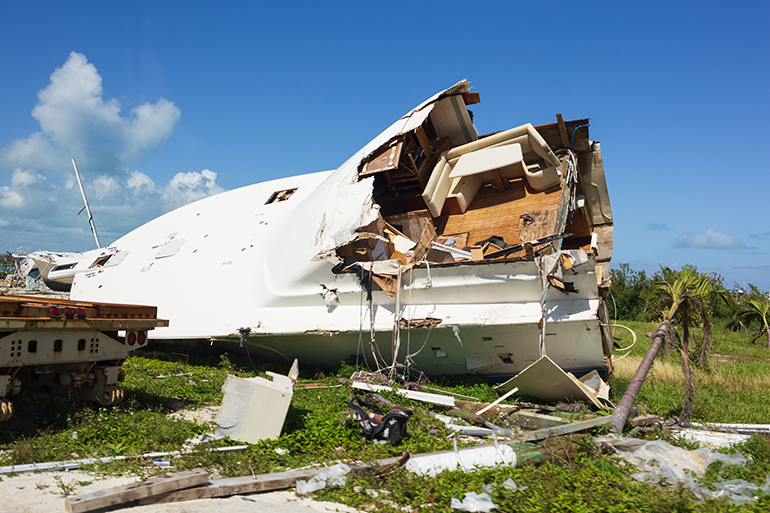By Tom Tracy - Florida Catholic

Photographer: TOM TRACY | FC
Damage was still clearly visible this February in Marsh Harbour in Abaco following 2019's Hurricane Dorian. Catholic Charities of the Archdiocese of Miami is now facilitating the disbursement of a $ 340,000 grant for rebuilding awarded by Catholic Charities USA.
MIAMI | As the United States moves back toward increased COVID-19 containment measures, the Bahamas is emerging from a second-wave raft of impositions on gatherings, travel and in-class education.
The island recently lifted 24-hour weekend curfews and has managed to slow COVID infection rates, though the pandemic has left scars on the economy and workforce. Particularly hit were the tourism and cruise industries, so important to the Bahamas economy.
“It is difficult and challenging, no doubt about it: There has been a lot of belt-tightening and a lot of people have been laid off,” said Nassau Archbishop Patrick Pinder, who has been preoccupied this year with rebuilding churches and schools following last year’s devastating Hurricane Dorian. “Certainly this is a long journey we are on and to some extent a painful journey.”
The Johns Hopkins University COVID Tracker tool shows, as of the end of November, a total of 7,496 cases of COVID-19 in the Bahamas with some 163 associated deaths.
Archbishop Pinder said he has not traveled internationally since last January. He noted that Bahamians can travel to the U.S. but first need to show timely negative COVID-19 PCR swab test results both when exiting and returning to Nassau. Recently, they also have been required to quarantine for a two-week period. Likewise, visitors going to the Bahamas need to be tested and to acquire a health visa.
The result has been a reduced flow of visitors, tourists and business travelers to the islands in 2020.
Archbishop Pinder said church attendance around the islands has been restricted to about 30 percent of church capacity after in-person attendance was allowed starting in early June, along with required mask-wearing, social distancing and hand sanitizing safety protocols.
“We had a tremendous spike starting about two months ago and then some restrictions, but this coming weekend is about the first weekend that we are not under a total lockdown,” he added during a mid-November phone interview with the Florida Catholic.
The pandemic travel restrictions also slowed inter-island travel, creating delays in some of the Hurricane Dorian rebuilding projects and hurricane relief efforts.
“The economic engine in this country is the tourism sector and our tourism sector has been closed down since March, which means there are literally thousands of people out of work,” the archbishop noted.
But many of the major resorts have indicated that they are going to be reopening, some as early as the first week of December.
“That is going to be a very positive thing as we go into Christmas. It certainly won't be the kind of Christmas we had before for a number of reasons, not the least of which is all the (large) gatherings won’t be able to happen,” Archbishop Pinder said. “But the fact that we are beginning to open up again and that tourists have been allowed to travel with certain restrictions will be a tremendous relief given the current circumstances."
“And so we will have a much more positive Christmas than what we have been (living with) over the last six months,” he added.

